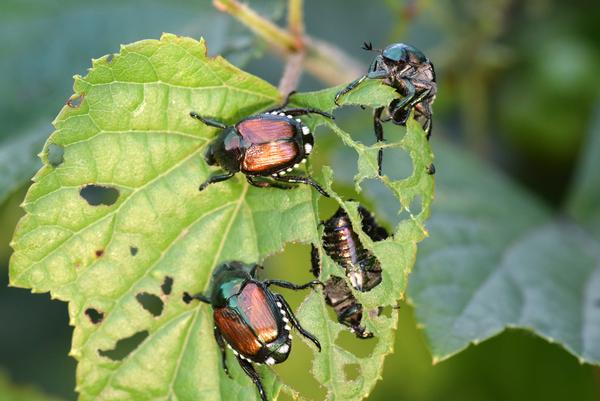If you’re noticing that the leaves on your plants suddenly look like a lacey skeleton, the issue may be Japanese beetles. On the front range of Colorado, Japanese beetles tend to strike in late June, July, and August. They can be identified by their metallic blue-green head, copper back, tan wings, and twelve tufts of white hair around their abdomen.
Japanese Beetles In Colorado
The Japanese beetle arrived in Colorado in the early 1990s from nursery stock acquired in the mid-western United States. Scientists and specialists were surprised by the pest’s ability to establish itself in the Colorado area, believing that the Japanese beetle, an insect that prefers wetness and humidity, would never become a problem in the dry Colorado environment. However, the urban landscape regions, on the other hand, are an oasis of lush, irrigated plant material that the beetle likes to consume and grow in.
Japanese beetle is comparable to a noxious weed in Colorado commercial nurseries and garden stores. This pest is not tolerated at all because it has severe economic ramifications for nurseries that export stock to western states. If Japanese beetles are found in nurseries, landscaping contractors, or garden centers, strong chemical treatment is required. Retail nurseries would never sell a noxious weed, and they make every effort not to sell Japanese beetle-infested plants.
This bug is equally harmful to homeowners, landscape managers, and Colorado farm producers. In Colorado, ornamentals, grasslands, and fruit crops can sustain substantial damage. Controlling the Japanese beetle in Colorado will take some effort, but it is necessary to keep this pest at bay.
Got Beetles?
There are certain plants, flowers, and trees the Japanese beetle in Colorado love to munch on. Fruit trees like plum, roses, Virginia creeper, linden trees, birch, crab apple, rose of Sharon, raspberries, and pin oak are likely to attract Japanese beetles lurking in your yard.
What Should You Do?
If you notice that Japanese beetles have been ravaging your plants, you’re going to want to take action quickly to save the rest of your greenery from suffering the same fate.
Hand Pick Adult Beetles
This may sound tedious, but hand picking the beetles is one way to start gaining control of the situation, especially if you catch it early. It will require lots of attention for several weeks while the beetles are feeding. You can put a drop cloth under the affected plant and give it a good shake. This will cause the beetles to drop and you can collect them and drop them into a bucket filled with soapy water. Once you’ve done this, remove any other dead beetles or damaged leave to minimize attracting more beetles.
Try Companion Planting
This isn’t always an immediate solution, but in the future, you can plan on incorporating plants in your yard or garden that repel Japanese beetles. These include garlic, chives, catnip, odorless marigold, white geranium, rue, or nasturtium.
Create a Barrier
To protect your plants from further attack, you can create a physical barrier between them and the beetles. Use row covers during the feeding period, and that should help shield them from becoming a Japanese beetle’s snack.
Apply Neem Oil
Neem oil is considered safe for bees and other beneficial insects when used properly, so you can try using this botanical insecticide at the first sign of beetle damage. Mix 4 teaspoons of neem oil per gallon of water. Only spray it at dusk or dawn to avoid burning the leaves or potentially harming other pollinators. You can use a sprayer to soak your entire lawn or concentrate on the areas around the affected plants. Apply about every 7 days while the beetles are feeding.
Be Weary of Chemical Sprays
Running to the store and buying a product that claims to get rid of these pests may not be the best course of action. Some products have not been proven effective at protecting your plants. In fact, some of them can be quite toxic and kill off other good insects in your yard like bees. If you want to spray for Japanese beetles, it is best to consult with a professional.
Get a Professional Opinion
If you are concerned about the mitigation of the Japanese beetle in Colorado, contact Splintered Forest for a free assessment. Our Licensed Applicator (with the Colorado Department of Agriculture) is ready to help you protect your landscape.

